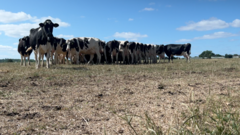Is Drought Devastating Our Farmers' Grass Supply?

The Dairy Farming Crisis: Adapting to a Changing Climate
The dairy farming industry is in the midst of a crisis, one that has been exacerbated by climate change. Farmers like Sarah Godwin from north Wiltshire are facing unprecedented challenges due to a long, dry spring that has drastically altered the environment in which they operate. With the warmest and sunniest spring on record, many dairy farmers are spending thousands of pounds on feed that should ideally be saved for the winter months. This article delves into the reasons behind this crisis, the impact on farmers, and the broader implications for the dairy industry as it grapples with a changing climate.
Understanding the Impact of Climate Change on Dairy Farming
Climate change has become a buzzword that resonates across various sectors, but its influence is particularly pronounced in agriculture. The dairy farming sector is particularly vulnerable due to its reliance on natural resources like grass, which is essential for healthy cattle. The recent weather patterns have led to drastic changes in the availability and quality of pasture, forcing farmers to adapt quickly.
Record-Breaking Weather Patterns
According to meteorological data, spring 2025 was the warmest and sunniest on record, while also being the driest since 1893. This combination of extreme temperatures and lack of rainfall has had a profound effect on pasture growth. Professor Nicola Cannon from the Royal Agricultural University points out that spring is the most critical season for plant growth; without adequate rain and appropriate temperatures, grass cannot thrive. Even when the sun shines, if the grass hasn't grown properly, the nutrients it provides will be insufficient.
The Effects on Dairy Cattle Nutrition
Farmers like Sarah Godwin have experienced firsthand the detrimental effects of this weather. With the grass on her farm completely dried up and devoid of nutritional value, she has had to resort to feeding her cattle grains and cereals—something she has never had to do before. This shift not only strains the farmers financially but also disrupts the natural grazing patterns that dairy cattle have relied on for generations.
The Financial Burden on Dairy Farmers
Feeding cattle with grains, which are typically saved for the winter months, imposes a significant financial burden on dairy farmers. The costs associated with purchasing additional feed can quickly add up, leading to a precarious financial situation for many. With yields reported to be down by as much as 50% in regions like Wiltshire, farmers are left grappling with not only diminished income but also the long-term sustainability of their operations.
Strategies for Coping with the Crisis
In light of these challenges, many farmers are exploring various strategies to cope with the crisis. Some of these include:
- Diverse Crop Rotation: Introducing a variety of crops can help improve soil quality and reduce dependency on a single source of feed.
- Water Management: Implementing effective irrigation systems can mitigate the effects of dry spells and ensure crops receive adequate moisture.
- Investment in Technology: Utilizing precision farming technologies can help farmers monitor their crops more effectively, allowing for timely interventions.
- Financial Planning: Farmers are encouraged to develop robust financial plans that account for unexpected weather conditions and market fluctuations.
Looking Ahead: The Future of Dairy Farming
The future of dairy farming is uncertain, with climate change posing challenges that require urgent attention. As temperatures continue to rise, the industry must adapt to survive. Some farmers, like Mrs. Godwin, jokingly suggest alternative avenues, such as growing wine, highlighting the dire situation they face.
Exploring Alternative Farming Practices
In response to the ongoing crisis, some dairy farmers are considering alternative farming practices that could mitigate the impacts of climate change:
- Organic Farming: Transitioning to organic farming practices may yield healthier crops and animals while benefiting the environment.
- Sustainable Grazing: Implementing rotational grazing techniques can enhance pasture health and improve soil quality over time.
- Agroforestry: Integrating trees and shrubs into farming systems can provide shade, reduce soil erosion, and enhance biodiversity.
Conclusion: A Call to Action
The dairy farming crisis is a stark reminder of the fragility of our agricultural systems in the face of climate change. With the challenges posed by record-breaking weather patterns, farmers must adapt quickly to ensure the sustainability of their operations. The agricultural community, policymakers, and consumers must work together to create solutions that support farmers during these turbulent times.
As we face the realities of climate change, it’s crucial to ask ourselves: What role can we play in supporting our local farmers and promoting sustainable practices? The choices we make today will shape the future of dairy farming and food production as a whole.
FAQs
What are the main causes of the dairy farming crisis?
The main causes include extreme weather patterns, particularly a long dry spring that reduces grass growth, leading to financial strain as farmers must purchase additional feed.
How are farmers coping with the crisis?
Farmers are exploring strategies such as crop rotation, water management, investment in technology, and financial planning to cope with the crisis.
What impact does climate change have on dairy cattle nutrition?
Climate change affects the availability and quality of pasture, forcing farmers to provide alternative feeds that may not be as cost-effective or nutritious.
What are some sustainable practices dairy farmers can adopt?
Sustainable practices include organic farming, rotational grazing, and agroforestry, which can enhance pasture health and improve soil quality.
As we consider the implications of climate change on dairy farming, how can we encourage sustainable practices to ensure a resilient agricultural future? #DairyFarming #ClimateChange #SustainableAgriculture
Published: 2025-07-15 07:37:16 | Category: technology



